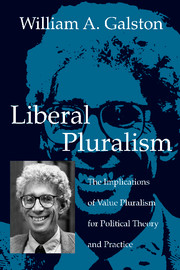Book contents
- Frontmatter
- Contents
- Acknowledgments
- LIBERAL PLURALISM
- I INTRODUCTION
- II FROM VALUE PLURALISM TO LIBERAL PLURALIST THEORY
- 2 Two Concepts of Liberalism
- 3 Three Sources of Liberal Pluralism
- 4 Liberal Pluralist Theory: Comprehensive, Not Political
- 5 From Value Pluralism to Liberal Pluralist Politics
- 6 Value Pluralism and Political Community
- III THE PRACTICE OF LIBERAL PLURALISM
- Index
6 - Value Pluralism and Political Community
Published online by Cambridge University Press: 20 March 2010
- Frontmatter
- Contents
- Acknowledgments
- LIBERAL PLURALISM
- I INTRODUCTION
- II FROM VALUE PLURALISM TO LIBERAL PLURALIST THEORY
- 2 Two Concepts of Liberalism
- 3 Three Sources of Liberal Pluralism
- 4 Liberal Pluralist Theory: Comprehensive, Not Political
- 5 From Value Pluralism to Liberal Pluralist Politics
- 6 Value Pluralism and Political Community
- III THE PRACTICE OF LIBERAL PLURALISM
- Index
Summary
Even though value pluralism is not relativism, it certainly embodies what Thomas Nagel has called the fragmentation of value. But political order cannot be maintained without some agreement. It is not unreasonable to fear that once value pluralism is publicly acknowledged as legitimate, it may unleash centrifugal forces that make a decently ordered public life impossible. Within the pluralist framework, how is the basis for a viable political community to be secured?
In this chapter I explore three kinds of responses to this question: the requirements of public order; the structuring processes of constitutionalism; and the force of ethical presumptions.
THE MINIMUM CONDITIONS OF PUBLIC ORDER
While pluralists cannot regard social peace and stability as dominant goods in all circumstances, they recognize that these goods typically help create the framework within which the attainment of other goods becomes possible. They recognize, then, that anarchy is the enemy of pluralism and that political community is (within limits) its friend. Pluralists must therefore endorse what I shall call the minimum conditions of public order.
For modern societies these conditions form a familiar list. Among them are clear and stable property relations, the rule of law, a public authority with the capacity to enforce the law, an economy that does not divide the population permanently between a thin stratum of the rich and the numerous poor, and a sense of membership in the political community strong enough (in most circumstances, anyway) to override ethnic and religious differences.
- Type
- Chapter
- Information
- Liberal PluralismThe Implications of Value Pluralism for Political Theory and Practice, pp. 65 - 78Publisher: Cambridge University PressPrint publication year: 2002



